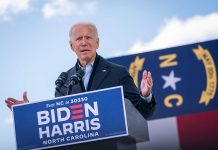
Mark Zuckerberg’s AI strategy is reshaping social media content delivery amidst a storm of political resistance, skepticism, and trust issues.
At a Glance
- Mark Zuckerberg spearheads AI-driven content on Facebook and Instagram.
- Meta reduces political content on their platforms to enhance user experience.
- A shift in trust towards AI content as traditional media faces credibility challenges.
- Meta faces scrutiny over Facebook’s past political influence.
Zuckerberg’s Shift from Politics to AI
In January 2021, Mark Zuckerberg directed Meta’s engineering teams to reduce political content on Facebook, appealing to users’ desires for less conflict. This decision aimed to improve user experiences and engagement by prioritizing content that makes users happier. However, contrary to expectations, the reduction did not boost Facebook engagement, resulting in decreased views of reputable news publishers and increased misinformation complaints according to documents obtained by The Wall Street Journal.
Charitable donations through Facebook’s fundraiser product also fell in the first half of 2022, while political content now constitutes less than 3% of total views in users’ newsfeeds, down from 6% around the 2020 election. The social media giant altered its algorithms to promote content users value, aligning with Zuckerberg’s broader AI strategy. Despite negative feedback, Zuckerberg remains focused on AI-generated content, which he sees as an emerging trend and potential game-changer for Meta platforms.
Mark Zuckerberg wants to stay away from politics. He and others at the top of Meta believed that both parties loathed technology and that trying to continue engaging with political causes would only draw further scrutiny to their company. https://t.co/QeUrsIQzuR
— The New York Times (@nytimes) September 24, 2024
Pressures and Influences on Meta
Decisive moves to restrict political content are part of Meta’s ongoing strategy post-2021, responding to scrutiny over political campaigning influences. A pivotal moment came in 2019 when Meta faced a $5 billion fine over the Cambridge Analytica scandal, amid investigations for Russia’s influence and perceived political bias. Now, as mentioned above, political content makes up around 3% of what users encounter on Facebook and Instagram, as more emotionally engaging topics, like celebrity gossip, gain visibility. Zuckerberg’s strategy increasingly embraces AI, a potential remedy to political pressures.
“I think we’re going to add a whole new category of content which is AI-generated,” suggests Mark Zuckerberg, reflecting on innovations driven by his AI focus.
Moreover, Zuckerberg rebrands as a libertarian, viewing AI as a refuge from political strains. In competition, TikTok’s successful AI-based recommendations have influenced Facebook and Instagram’s recent surge in user engagement. AI content emerges as an alternative to traditional and state-sponsored media, signaling a potential shift in public trust toward tech leaders amidst these changing dynamics.
Mark Zuckerberg on Meta's open source AI strategy: "We're not doing this because we're altruistic… I don't view it as giving it away, I view it as you guys all making it better for me" pic.twitter.com/BLO9ngEYkX
— Tsarathustra (@tsarnick) August 9, 2024
The Future of Social Media and AI
As social media evolves, Zuckerberg’s AI strategy marks a crucial turning point in content creation and delivery across platforms. Legacy media organizations increasingly lose public trust, hastening AI content adoption. Despite criticisms of AI quality, Zuckerberg views this evolution in content strategy as exciting for Facebook and Instagram’s future. Nevertheless, as AI-generated content gains traction, questions linger regarding public confidence in this burgeoning content form.
The ongoing global trend toward integrating AI within social networks extends beyond Zuckerberg’s vision. It speaks to an ongoing friction between conventional media’s authenticity and digital platforms’ rapid ascendancy. Zuckerberg’s AI venture reflects broader social challenges intertwining technological advancements with foundational journalism values, delineating the future landscape of reliable information dissemination.












